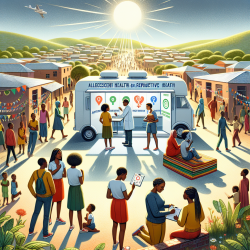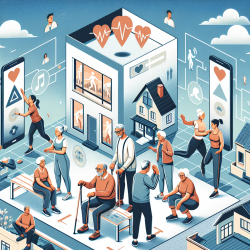In a world where healthcare accessibility remains a challenge for many, innovative solutions are crucial. The research article "A community-based mobile clinic model delivering PrEP for HIV prevention to adolescent girls and young women in Cape Town, South Africa" offers valuable insights into one such solution. This blog post explores how practitioners can improve their skills by implementing the outcomes of this research or by delving deeper into similar studies.
The Power of Mobile Clinics
The study highlights the effectiveness of a community-based mobile health clinic (CMHC) known as the Tutu Teen Truck (TTT) in delivering pre-exposure prophylaxis (PrEP) to adolescent girls and young women (AGYW) in Cape Town. This model integrates PrEP with comprehensive sexual and reproductive health services (SRHS), making healthcare more accessible and acceptable to young women.
Practitioners can draw inspiration from this model by considering how mobile clinics can be adapted to their local contexts. The TTT's success lies in its ability to provide services where AGYW naturally congregate, such as schools and community centers. This approach not only removes logistical barriers but also fosters a sense of trust between healthcare providers and the community.
Building Trust and Accessibility
The TTT's community-centric design has been pivotal in establishing trusting relationships with AGYW. Practitioners should consider how they can create similar environments that prioritize patient comfort and confidentiality. The use of biometric medical records in the TTT ensures privacy and continuity of care, which could be a valuable addition to other healthcare settings.
Moreover, the integration of PrEP with SRHS has been highly valued by AGYW. Practitioners should explore ways to offer holistic healthcare services that address multiple needs simultaneously, thus reducing the number of visits required and increasing patient satisfaction.
Challenges and Opportunities
While the TTT model has been successful, it is not without challenges. Community disruptions such as riots or severe weather can interrupt service delivery. Practitioners should be prepared to develop contingency plans for such scenarios. Additionally, exploring diverse delivery locations and modalities could help mitigate these interruptions.
The study suggests that a differentiated PrEP delivery model could better meet the needs of AGYW. Practitioners might consider offering multiple delivery options, such as local government clinics or community-based PrEP clubs, to ensure continuous access to healthcare.
Encouraging Further Research
This research underscores the importance of adapting healthcare delivery models to fit the unique needs of different populations. Practitioners are encouraged to conduct further research on mobile clinic models and other innovative approaches to healthcare delivery. By doing so, they can contribute to a growing body of knowledge that seeks to improve health outcomes for vulnerable populations worldwide.
To read the original research paper, please follow this link: A community-based mobile clinic model delivering PrEP for HIV prevention to adolescent girls and young women in Cape Town, South Africa.










